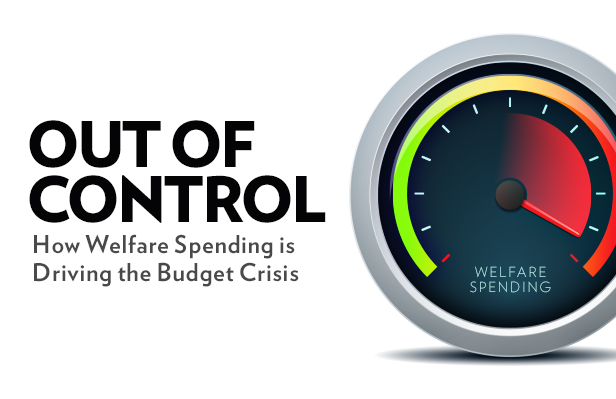Report

Out of Control
Governor Tom Wolf’s budget rhetoric boasts of higher taxation for public education. However, the largest proposed spending increase next year is found not in the Department of Education, but in the Department of Human Services (DHS). In fact, the Department of Human Services spends more than twice as much as the Department of Education when all funds are considered.
Governor Wolf is facing a budget situation more serious than any of his predecessors. His proposal includes an additional $691 million in the General Fund for DHS, bringing the department’s total to $11.9 billion. This increase accounts for nearly 89 percent of the total increase in the General Fund for all state agencies, absorbing 38.5 percent of the General Fund and 44.5 percent of all funds.
Wolf has proposed increasing tax revenue to maintain all-time high spending levels. Yet spending on human services programs has been increasing at a rapid pace, even after adjusting for inflation.
If the historic pattern holds, it will be only a matter of time before Pennsylvania lawmakers will need to decide between shifting resources to human services programs and raising more taxes. It is imperative, therefore, to consider alternatives to higher welfare spending.
Unfortunately, the proposed expansion of DHS programs poses far more than a fiscal problem. Governor Wolf’s proposal follows a long pattern of increased welfare spending that has proven ineffective at lifting Pennsylvanians out of poverty.
To create a welfare system that better utilizes limited state resources to prioritize the needy and promote a pathway out of poverty, policymakers and administrators must establish clear guidelines that define the most needy, ensure appropriate and flexible benefits, rules that promote work and independence, and a pathway out of poverty.
Specifically, lawmakers should consider the following recommendations:
- More Options for Medical Assistance: No other government program will squeeze future budgets more than Medical Assistance. Therefore, it would make good fiscal sense for members of the General Assembly to challenge Governor Wolf’s legal authority to undertake expansion. Second, the General Assembly may consider legislation directing DHS to pursue further Medicaid reforms with the federal government.
- Improve Work Options for Individuals with Intellectual Disabilities: Consider additional ways to promote employment in Office of Developmental Programs, utilize cost sharing and tighten rules on reimbursements.
- Encourage Private Long-Term Care: Explore reforms to mitigate the expected surge in taxpayer-financed long-term care, including tax credits to encourage the purchase of private long-term care insurance and tightening income and asset eligibility limits, such as Medicaid’s home equity exclusion of more than $500,000.
- Recover Support for Child Care: Require single-parents that utilize the Child Care Works Subsidy Program to seek child support.
- Improve Program Eligibility Tools: Use effective eligibility tools, such as asset tests and work requirements, to prioritize benefits for the needy while encouraging independence.
###
Erik Randolph is a Senior Fellow with the Commonwealth Foundation. He had served as a special assistant for two years to Public Welfare Secretary Gary Alexander, and he was a budget analyst for nineteen years for Democratic House Committee on Appropriations Chairman Dwight Evans.